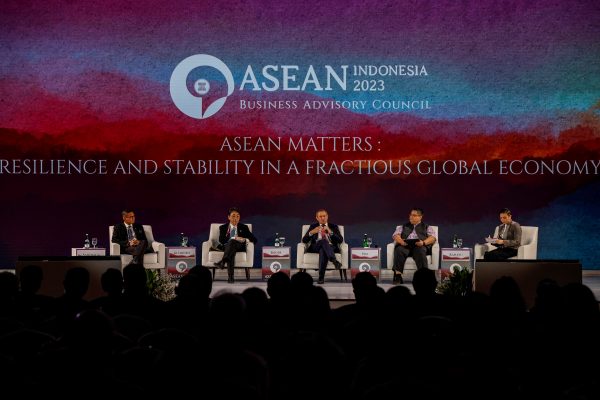Treating Indonesia as an afterthought, while prioritising engagement with Asian partners more eager to curry favour over aiding US efforts to check Chinese power, could prove costly for the United States in the coming decades. Biden skipped the ASEAN–US Summit and the East Asia Summit meeting of leaders in Jakarta while choosing to visit Vietnam instead. As two new and important Australian publications, Sam Roggeveen’s ‘The Echidna Strategy’ and the Moore Report on Australia’s Southeast Asian strategy emphasise, Indonesia’s large and youthful population and its strong growth prospects set it up to be a globally-significant economy and a major regional power over the coming decades.
The importance of Indonesia to the regional strategic landscape isn’t lost on Australia, by contrast, even if Australian policy is still struggling to adapt to the changing balance in each country’s economic and geopolitical importance. Australian Prime Minister Anthony Albanese was in Jakarta to attend the ASEAN meetings and spruik his government’s new trade and investment strategy for Southeast Asia. The economic case for deepening the Australia–ASEAN relationship is made clear by figures quoted by the Moore report — excluding the financial hub of Singapore and Timor Leste, home to large LNG investments, a puny 0.8 per cent of Australia’s stock of overseas investment goes into the Southeast Asian region.
Indonesia looms large as a tantalising market for Australian investment and exports. There are roughly 13 million households with an annual income of over US$15,000, the report says, but in two decades there will be an extra 50 million. The report identifies well-known barriers to greater trade and investment with Indonesia and the region and proposes some common-sense, though piecemeal, fixes for the underperformance of Australia–Indonesia and Australia–Southeast Asia economic ties.
The growing ability of the Indonesian economy to underwrite a bigger and more powerful defence force will see Indonesia emerge as one of a number of significant military powers that, though they might not cohere into an outright containment coalition of the kind the United States would like to see, will collectively counterbalance China’s power even as its strategic role eclipses that of the United States.
That scenario forms a key part of the argument that Roggeveen makes in his book on Australian security policy, which offers a vision for Australia that isn’t simply based upon on shoring up US primacy in Asia (the rationale that underpins AUKUS and much of current Australian security thinking). Roggeveen sees a more powerful Indonesia as an asset for Australia in finding security in a post-American Asia and proposes a quasi-alliance relationship based upon a shared interest in preventing any country — read, China but not only China — from being the dominant maritime power in Southeast Asia.
It’s a compelling idea. But like many ideas put forward to deepen the Australia–Indonesia economic relationship, it’s haunted by the question of what’s in it for Indonesia.
In 1995, when Australian prime minister Paul Keating and Indonesian president Suharto signed a landmark bilateral Security Agreement, Australian GDP was roughly twice that of Indonesia (not to mention almost half as big as China’s). Any vision for an economic and political relationship that Australia, or any other regional middle power, pursues with Indonesia over the coming decades will have to be attuned to Indonesia’s growing status as a globally-important economy and, potentially, a big power in strategic terms.
Posing as a benefactor won’t work over the long run, because Indonesia is already thinking of itself as a developed economy in-waiting, with the fiscal capacity to take care of its own development challenges.
Indeed, as John West details in this week’s lead article, Indonesia is ‘the first emerging G20 economy and ASEAN member to seek OECD membership.’ The effort of seeking OECD membership alone might prompt welcome reform that would lift Indonesia’s economic potential, because the OECD’s accession process ‘scrutinises the quality of many policies, notably openness to international and domestic competition and governance quality, including for state-owned enterprises.’
For Australia, a vision of the relationship with Indonesia based upon just closer bilateral ties isn’t going to cut it — the overarching logic of the relationship has to be a global one built for the global stage, asserting both countries’ interest in multilateralism and open trade. Indonesia’s bid for OECD accession offers the opportunity to put this ethos into practice. As Rania Teguh and Fajar B Hirawan argue, ‘by partnering with Indonesia through its accession, Australia could also position itself to support Indonesia with necessary reforms as it pursues advanced economy status by 2045’.
Politics in Indonesia always threatens to hold good policy back, given the sway of vested interests, corruption and nationalist economic ideologies. But the rise of a more affluent and better-educated electorate, as this evidence suggests, offers a chance to steadily diminish the importance of patron–client politics at the grassroots and create the demand for a more serious contestation over different national policy visions in the longer run.
The EAF Editorial Board is located in the Crawford School of Public Policy, College of Asia and the Pacific, The Australian National University.

